Violinist Gérard (Georges) Poulet was born on 12 August 1938 in Bayonne in the south of France, and he won the Paganini Competition in Genoa at the age of eighteen. Poulet was never the most showy violinist, but from the very beginning always in full control, both technically and musically. As a reviewer wrote, “his mature interpretation has no haste, but depth and calmness when demanded and lightness in the outer movement.” Mind you, this reviewer was listening to a recording of Mozart’s G-Major Concerto K. 216 for the Remington label in Vienna when Gérard was 13 years old.
Gérard Poulet Performs Mozart’s Violin Concerto No. 3 in G Major, K. 216
Famous Lineage
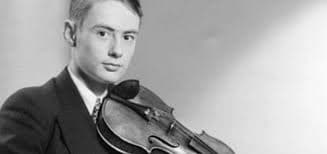
The young Gérard Poulet
Gérard was the son of the rather famous violinist and conductor Gaston Poulet. One of the most recognised violinists of his generation, he was the leader of the orchestra for performances by the Ballets Russes. As such he played in a good many premieres, and he also founded an eponymous string quartet with Henri Giraud, Albert Leguillard, and Louis Ruyssen. The Poulet Quartet focused on contemporary music of the first half of the 20th century, including the quartet by Claude Debussy.
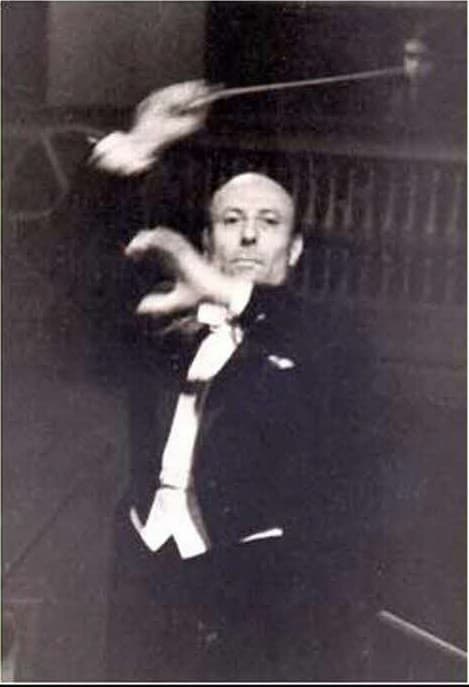
Gaston Poulet
Most famously, Gaston Poulet played the premiere of Debussy’s violin sonata on 5 May 1917 at the Salle Gaveau in Paris, accompanied by the composer. Gaston played a significant role in shaping the violin part as Debussy was not a violinist. Debussy had entered the bow articulations into the piano score, but it was Gaston’s job to create bowing that, as closely as possible, followed the composer’s vision.
Claude Debussy: Violin Sonata in G minor (Gerard Poulet, violin; Yori Kawashima, piano)
A Child Prodigy
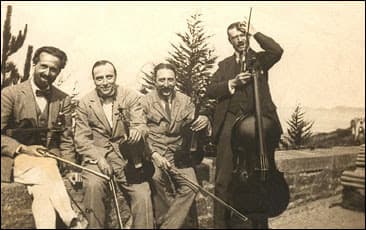
Poulet Quartet
Gérard clearly inherited his special musical gifts from his father, and he was quickly identified as a child prodigy. His father introduced him to the violin at the age of 5 and provided his first lessons. Gérard progressed rapidly, and he was admitted to the Conservatoire National Superieur in Paris at the age of 11, studying with André Asselin. He graduated within two years and was unanimously awarded first prize.
Gérard made his first concert appearance in 1951, with his father conducting l’Orchestre des Concerts Colonne, and performing the Mendelssohn Violin Concerto. He was an instant sensation and engaged to appear in various European cities, including Vienna. Producing first recordings for the Remington label, a critic wrote, “the Poulets are a father and son team to be reckoned with. The youth fiddles with more than a modicum of understanding; his father wields a perceptive baton.”
Gérard Poulet Performs Saint-Saëns’ Havanaise, Op. 83
Winning the Prestigious Paganini Competition
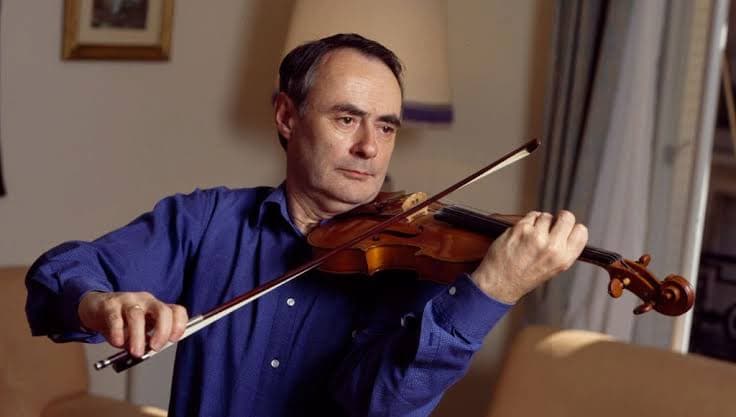
Gérard Poulet
Winning the prestigious Paganini Competition in Genoa in 1956 resulted in countless concert and recital engagements around the world. Like all winners of that competition, Gérard got to play Paganini’s own violin, the famous “Cannone.” In addition, he continued to take lessons and masterclasses from such greats as Zino Francescatti, Yehudi Menuhin, Nathan Milstein, and Henryk Szeryng, who considered him his “spiritual heir.”
Gérard Poulet excelled in his performances of Romantic music. Showcasing a flexible cantabile tone, “drifting effortlessly from honeyed sweetness to heartfelt profundity,” was part of his rhetoric in conveying a musical narrative. A critic writes, “despite his admiration of Szeryng, Poulet’s playing does not have Szeryng’s tough-minded, rather distant modernism, but an extraordinary warmth and depth which, when combined with a wide vibrato and a refreshingly open attitude to portamento, makes him sound rather old-fashioned—enjoyably so, in fact.”
Gabriel Fauré: Violin Sonata No. 2 in E minor, Op. 108 (Gérard Poulet, violin; Noël Lee, piano)
Teaching Career
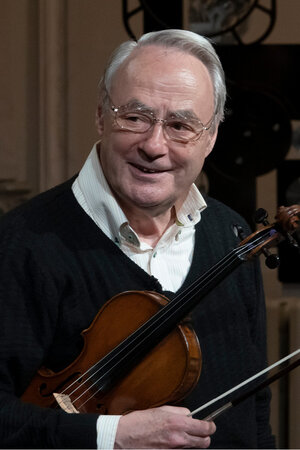
Alongside his illustrious performing career, Gérard Poulet also became one of the greatest pedagogues of our time. Having enjoyed the guidance of illustrious master, Poulet followed in their footsteps and started a teaching career as well. Poulet taught for a long time at the “Conservatoire National Supérieur de Musique de Paris,” the “Conservatoire National de Région de Paris,” and the “Ecole Normale de Musique in Paris.”
He accepted a Professorship at the National University of Fine Arts and Music of Tokyo in 2005. A highly personable teacher, Gérard Poulet is adamant that students carefully examine and respect the score. And given his experience and lineage, Poulet always provides wonderful context and relates personal experiences and anecdotes.
For more of the best in classical music, sign up for our E-Newsletter

An outstanding portait of Gerard Poulet, remarkably well-informed and written, your article is a well-deserved tribute to a musical giant who is not searching for the limelight but has influenced generations of European and Japanese violinists.